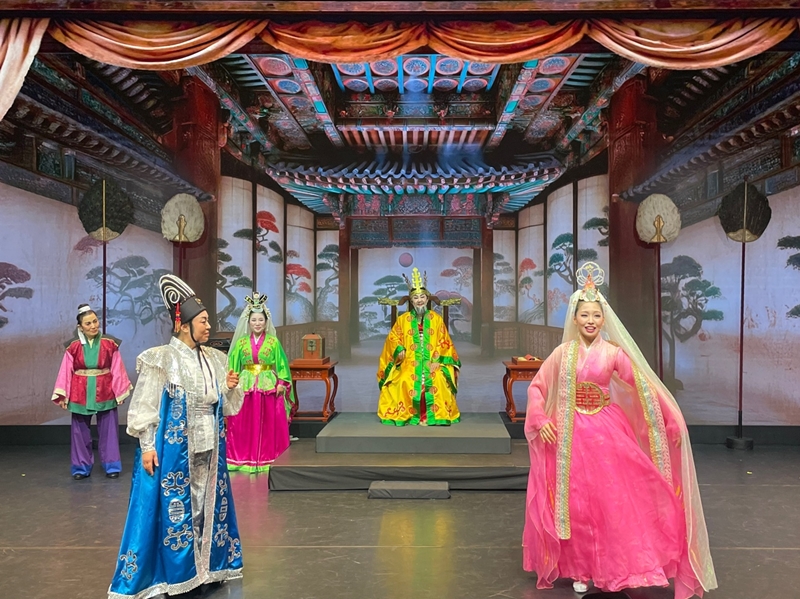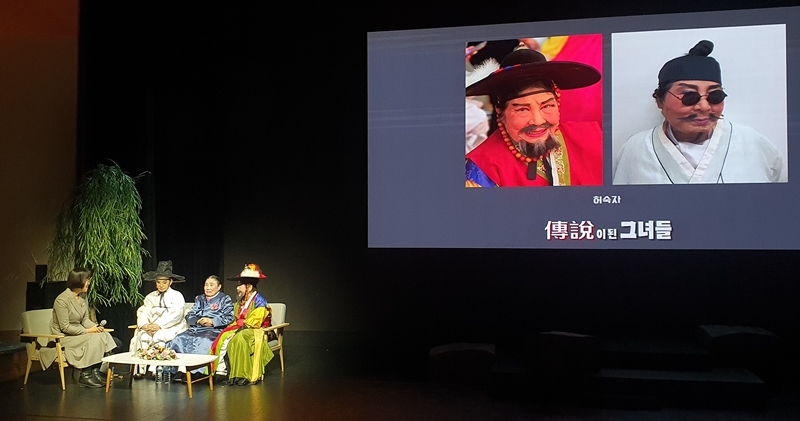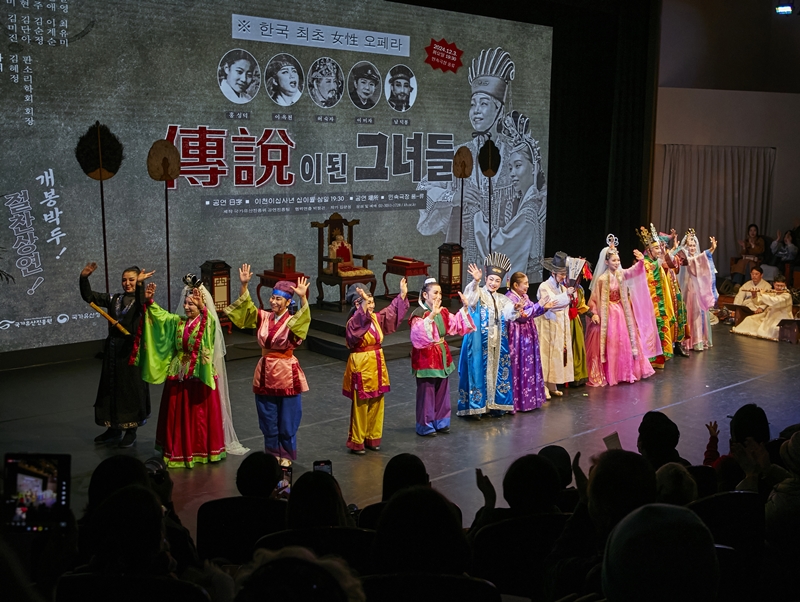
The yeoseong gukgeuk work "Korea's First Women's Opera: Women Who Became Legends" is held on Dec. 3 at Folk Theater Pungryu in Seoul's Gangnam-gu District. (Kim Seon Ah)
By Lee Kyoung Mi and Kim Seon Ah
"What I saw today was a whole new world."
This is what the protagonist of a historical K-drama says after seeing a performance of yeoseong gukgeuk, a form of traditional women's theater, for the first time. Enraptured by the performers on stage, she spends all night thinking about the female cast.
"Jeongnyeon: The Star is Born," which ended last month, is set in the 1950s has as its protagonist Jeongnyeon, who seeks to join yeoseong gukgeuk and emerge as the top performer there. Because the hit series reignited interest in the genre, the Korea Heritage Agency (KHA) has shone the spotlight on the forgotten genre to revive it.
"Korea's First Women's Opera: Women Who Became Legends" was held on the evening of Dec. 3 at Folk Theater Pungryu in Seoul's Gangnam-gu District. The first part featured a talk by veteran cast members of yeoseong gukgeuk and the second depicted Princess Seonhwa as played by both new and veteran actors, with the packed house seemingly attesting to the resurgent popularity of the genre.
Yeoseong gukgeuk is a comprehensive form of theater in which women sing, dance and act in playing both male and female roles. Launched in 1948, it was highly popular during the Korean War (1950-53) but gradually disappeared with the rise of movies and TV.
The performance was initially a one-off affair, but after seats were sold out in 40 minutes after reservations were opened, the theater received a barrage of requests for an extended run. This overwhelming but unexpected response led to the addition of two shows.
So what about this forgotten genre attracts audiences?

Veteran yeoseong gukgeuk actors on Dec. 3 speak at a Q&A after the performance "Korea's First Women's Opera: Women Who Became Legends" at Folk Theater Pungryu in Seoul's Gangnam-gu District. (Lee Kyoung Mi)
"Yeoseong gukgeuk is a comprehensive art and the roles of male characters are particularly important," said Hong Seong-deok, a veteran performer who heads an association for the art form. "(To appeal to the audience, actors) need to look good to play male roles while singing, dancing and acting."
The cast looked and sounded and acted like men in the performance. Master vocalist Lee Ok-cheon, who is dubbed the "original Jeongnyeon" and played male characters, was so popular among her fans that she even received a letter from one written in blood.
Other actors took virtual wedding photos per fan requests. Pansori Society chief Kim Hye-jeong recalled her memories during yeoseong gukgeuk's heyday, saying, "Fan activities nowadays pale in comparison."

The cast on Dec. 3 wave to the audience after completing their performance of "Korea's First Women's Opera: Women Who Became Legends" at Folk Theater Pungryu in Seoul's Gangnam-gu District. (Korea Heritage Agency)
Actor Kim Geum-mi, who played the male character Seodong in the yeoseong gukgeuk production "Seonhwa Princess," said yeoseong gukgeuk is appealing for three reasons: an all-female cast, makeup unique from other traditional ones and the preservation value of its beautiful handmade costumes from 20-30 years ago.
Before the performance, actor Park Ji-yeon, who plays Princess Seonhwa, expressed confidence in the resurgence of yeoseong gukgeuk. "I think the opportunity has come for the genre to again establish itself with the public," she said. "Seeing a performance in person will make you realize how special and different yeoseong gukgeuk is."
The genre's counterparts in East Asia are the Takarazuka Revue in Japan and yueju opera in China; the two receive support from their country's local and central governments to continue their tradition and development. Yeoseong gukgeuk, however, is hard to find in Korea, apparently losing its place in the country.
To ensure that public interest in the genre continues beyond the temporary boosting effect of the K-drama "Jeongnyeon," the arts and culture industry urges persistent efforts for systematic support and management like designation as national intangible cultural heritage.
On its official YouTube channel, the KHA on Dec. 27 will release the video of the performance.
km137426@korea.kr